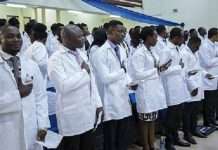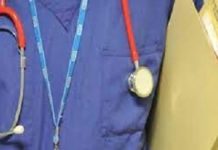By Adebayo Oladejo
In this exclusive interview with Pharmanews, Mr. Ibikunle Olusola, MD/CEO of Sifomedics Clinical Laboratory, a subsidiary of Sifoworld Investment Limited, spoke extensively on the importance of clinical diagnosis in health care delivery, the challenges facing medical laboratory practice in the country, and what government and the practitioners can do to improve the current situation.
He also spoke about the endless wrangling and rivalry among healthcare providers in Nigeria and the effects on the country’s health sector. Excerpts:
How crucial is clinical diagnosis to quality healthcare delivery?
People’s prognosis strictly depend on their diagnosis, meaning that if a clinical diagnosis is not adequately and meticulously done, the life of the patient involved is at risk.Such a diagnosis will mislead the clinician as well as the public, while subjecting the patient to untold trauma.So,it is of great importance to know that clinical diagnosis is the bedrock of every medical treatment.
However, talking about inaccurate diagnosis, there are lots of factors that could be responsible for this.Firstly, government is supposed to be monitoring the reagents that are being brought into the country – their year of their production, how long they had stayed on the sea, the conditions they had been subjected to and so many other considerations. But this is not often the case.
Aside that, as the day go by, the quality of education in the country keeps dropping and, as such, the quality of laboratory scientists produced in the country also continues to plummet – just like it is with other professions.
Moreover, apartfrom the challenges of reagents and personnel, there is also the problem of quackery. Many outlets and individuals, including patent store chemists, now runpregnancy, malaria, and so many other tests.In most cases, they do this without anybody monitoring their activities. Even in the hospitals where we expect a greater level of sanity and where there should be a standard laboratory being run by a qualified medical laboratory scientist, assisted by a technician or medical laboratory assistant, what we find is that most of them go below the standard, employ the service of maybe a science laboratory student or an IT student to man the laboratory.This contributes a lot to the problem of poor and inaccurate diagnosis.
Can you specifically highlight the challenges facing laboratory science practice in Nigeria and how they can be resolved?
There are lots of challenges facing the practice, either as a course of study in higher institutions or as a profession. We thank God for the introduction of the bachelor degree programme, because it used to be a higher diploma programme in the past; and the problem of where to fix the qualification usually brought a lot of problems then.Even at a time, around 1997, students who graduated as medical laboratory scientists were not allowed to go for national youth service as a result of misinterpretation of their qualification. But,thank God, it has been taken care of now.
Meanwhile, professionally, when it comes to the medical set up, we have some setbacks as medical laboratory scientists, even in the civil service. The kind ofrecognition that is being given to other medical professional is not accorded to the medical laboratory scientist. We have always been considered as second class citizens before the authorities in the health sector.But,as God would have it, the federal government signed a bill back in 2003 that gave the medical laboratory scientist the autonomy to become a director.
Still, the major challenge is the on-going rivalry between medical laboratory scientists and the pathologists, which is centred on who takes authority from who; who heads the department, and so on.And the challenge is still there as there are on-going legal cases here and there.
From your years of practice,what health condition would you say is most commonly sent to the laboratory for diagnosis in this part of the world?
The prevailing health condition is malaria.And let me tell you, malaria has graduated beyond the level of being an epidemic; it is something else because mosquitoes are everywhere, even inside your car, your office and your bedroom – and this is being worsened by the increasing number ofdirty drainages and environmental pollutants.
On the average, how many cases do you get in a day?
We get, at least, ten malaria test requests in a day.
How do you see the recent escalation of professional disputes among healthcare practitioners in the country?
Very recently, all the medical bodies, except the medical doctors, went on strike.This is because the system in which we findourselves does not really project ahead of time.If the people in charge had projected ahead of time and there was no selfishness, we wouldn’t have dwelt so long on the belief that only medical doctors can attain the position of health minister.
Imagine the short period that another professional, a pharmacist, in person of Prince Julius Adelusi-Adeluyi spent there as health minister. He was victimised throughout his tenure. That is the situation we have in in this country. It is until we get to the point that werealise that health care work is teamwork, just like it is in the United Kingdom where the pattern in the health system is that you man your own discipline and everybody works together towards one goal (the well-being of the patient), that things will improve.
In Nigeria, we focus more on power tussle – who leads the healthcare sector, who are the most recognised, the most acknowledged – forgetting that even an ordinary cleaner in the healthcare sector is important.Until we come to realise that, this rancour will not stop. This is why we have series of legal cases in court. We need to realise that everybody in the healthcare sector needs recognition, and that there are no more underdogs in the health care sector.Gone are the days when there was limitation to the educational attainmentsof some professionals. Nowadays, there are lots of PhD holders in Pharmacy, Medicine, Laboratory Science, and so on.So what are wefighting over?
What can you say about the level of awareness of people on the activities of medical laboratories and diagnostic centres across the country?
In all sincerity, the awareness to have one’s system regularly checked is very low in this part of the world. Hardly would you see people come in here for general check-up – to check their kidney condition or liver function.All they come to the laboratory for is pregnancy test and malaria. So we need a lot of orientation at every level, even at the government level. Imagine some members of the National House of Assembly running away from medical examination when they were to be checked for cardiac and other tests!
Where do you hope to see laboratory science practice in Nigeria in the next ten years?
Ten years is even a long time.Why not in the next five years? I wish that by that time, every diagnosis done at any centre in Nigeria would be without error, such that when somebody is diagnosed of typhoid, it is truly typhoid; and when a liver function result is released, the report of the enzyme that research laboratory A getsis exactly what another research laboratory, even of the highestcadre, will get.At that point, healthcare providers will have a rest of mind.











